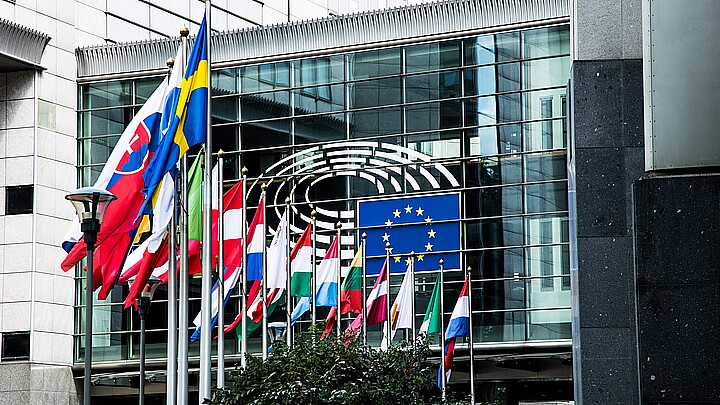Human Rights
Cuban artist exposes State Dept. ties to 'MIPYME' small business that fired him for anti-regime comments
The revelations shed new light on the troubling contracting practices of the U.S. State Department at the U.S. Embassy in Havana

February 9, 2024 2:15pm
Updated: February 12, 2024 1:02pm
Cuban artist Álvaro Hernández made headlines last year after he was fired from MadWoman, a Havana-based marketing agency that took issue with his decision to write “Down with the Dictatorship,” on the X social media platform.
While Hernández’s comment only garnered two online reactions, his firing has shed new light on his former employer, raising new questions about the company’s purported links to the Cuban regime and whether or not the State Department hired a government-sponsored entity to promote its events at the U.S. Embassy in Havana.
After escaping from the communist dictatorship in Cuba, Hernández and his life partner, Betto Gongora, who also worked at MadWoman, gave interviews to ADN from the U.S. border in Mexico where the two whistleblowers are seeking asylum.

MadWoman operates as an independent ‘MIPYME’ but Hernández’s supervisors implied it had connections to the Cuban regime
MadWoman purports to be a ‘MIPYME,’ an acronym commonly used to identify small businesses in Cuba run by entrepreneurs who operate independently of the socialist state. As such, they are exempt from U.S. sanctions that prohibit Americans from doing business with enterprises or individuals affiliated with the Castro regime.
The company, registered formally as MD Creativa S.R.L, was largely unknown until it fired Hernández, who recently said the agency’s Director of Operations, Laura Trujillo, and its Chief Strategist, Disley Alfonso Santos, told him in a meeting that his post was the reason behind his dismissal.
“When I got to the meeting, they showed me my post on X and asked me: “What is this?” Hernández recalls. “That is what I think,” the 22-year-old says he replied. “I didn’t say much during the whole conversation.”
The 22-year-old admitted feeling surprised that something like this was happening to him in a "private" company.
“It is something you expect on a state-owned company but not on a MIPYME,” he said, further explaining that “many times there were comments made inside the company criticizing the inefficiency of the Cuban government.”
But Hernández said that the puzzle made more sense to him when he heard Disleidy Alfonso implied during his dismissal that although they were registered as a Mipyme they were also part of the Cuban government and couldn't have employees making such comments.
“They gave me several reasons why they had to 'indefinitely separate me from my roles at the agency' since they were a government-owned company and couldn't have employees making such comments,” he recalls.
According to a MadWoman employee manual reviewed by ADN, the company requires its staff, contractors, and collaborators to “refrain from making posts or sharing content that may go against the policies established in the country [Cuba].”
ADN reached out to MadWoman, but as of the time of publishing this report, has not yet received a response.
Hernandez and Gongora tell ADN that MadWoman was a vendor for the U.S. State Department and Embassy in Havana
While MadWoman’s new, reputed status as a government-sponsored enterprise operating as a MIPYME is nothing new, Hernández’s revelations to ADN about his former employer’s contracts with the U.S. government raise troubling questions.
After Hernandez’s initial revelations to the press, he went into deeper detail with ADN, revealing that his former employer was producing promotional materials for the State Department and U.S. Embassy in Havana.
Hernández says he was personally involved in several projects that MadWoman undertook for the U.S. State Department, including providing the voice-over for a campaign aimed at curbing illegal immigration. His boyfriend, Betto Gongora, who worked as a graphic designer for MadWoman also worked on various campaigns commissioned by the U.S. Embassy in Havana.
While Biden has personally condemned Cuba as a “failed socialist state” his State Department has repeatedly collaborated with regime institutions that frequently engage in discriminatory practices, such as the Ministry of Culture, and Instituto Superior de Arte (ISA).
While working for MadWoman, Hernández’s partner, Gongora designed the artwork for an embassy event that celebrated Black History Month with regime institutions that harassed Black artists and intellectuals.

Both the Ministry of Culture and the Instituto Superior de Arte (ISA) have faced allegations from Cuban artists and students who have been subjected to harassment and intimidation due to their political beliefs. This includes world-renowned activist artists Mykel Osorbo and Luis Manuel Otero Alcantara –now languishing in prison for writing songs about freedom.
The Cuban Ministry of Culture’s ex-minister, Abel Pietro, and its current director, Alpidio Alonso, have also been accused of racial slurs against Afro-Cuban artists, and for sanctioning violence against journalists respectively.
Other jobs for the Havana Embassy included promoting an on-site performance of jazz artist Ted Nash, and other events that earned criticism from human rights activists who lashed out at the U.S. Embassy’s attempts to whitewash the regime's repression as part of a covert effort to convince President Biden to ease sanctions.

Yet, State Department official, Eric Jacobstein suggested during a House Foreign Affairs Committee inquiry that the U.S. Embassy in Havana would know when a Mipyme is a front because it does its due process.
“Our embassy in Havana, regularly engages with entrepreneurs and often visits their place of business and they have ongoing conversations with these individuals so any derogatory information received on entrepreneurs is reviewed carefully,” he said.
Both Hernandez and Gongora explained that the projects in which the U.S. Embassy was involved were treated with high secrecy by MadWoman leadership and the staff was not allowed to interact with those “high profile clients” or had meetings with them.
In the case of MadWoman, the Mipymes recently moved from its previous office on 15 Avenue between 8th and 10th to Residencias Miramar, a new office space that belongs to Inmobiliaria CIMEX, S.A, an entity sanctioned by the United States government.
According to Hernández, he was specifically told that another one of the reasons for his dismissal was that MadWoman was about to get new shared office space with CIMEX and that his criticism of the regime could jeopardize the company.

Inmobiliaria Cimex belongs to Corporación CIMEX S.A. a Cuban state-owned conglomerate headed by Colonel Héctor Oroza Busutil.
Cimex is involved in the import and export of goods, tourism, and banking, and operates as part of the GAESA military consortium, which is also sanctioned by the U.S. Office of Foreign Asset Control (OFAC).
When inquired about the relationship between MadWoman and Cimex one State Department official simply said to ADN that, “as part of our work to advance U.S. policy in Cuba, the U.S. Embassy in Havana follows applicable law, policy, and processes when procuring goods and services from Cuban entities, including MadWoman, a Cuban Mipyme.”
Hernández also recalls his former employer pointing out two other corporate clients who could take issue with his political views, Cerveceria Parranda and Mandao.

While Cerveceria Parranda is a known Cuban regime-owned entity, Hernández was not given an explanation as to why Mandao–a private company registered in Delaware but operates in Cuba–would purportedly have a problem with his views.
The company’s website lists a physical address at 1 Alhambra Plaza, PH floor, Coral Gables, FL, 33134, but started operating as a home delivery business in 2019 in Cuba during the pandemic.
However, having a client like Cervecería Parranda might contradict what Mr. Jacobestein reiterated to Rep. Salazar during a recent hearing when discussing MYPIMES:
“These are individuals who make no money from the state economy and have no way to survive,” portraying the entrepreneurs the U.S. government was aiding as extremely vulnerable, which does not seem to be the case with MadWoman, which even uses office space belonging to the military conglomerate
According to Hernández, many of his colleagues quietly speculated that someone at MadWoman had to work for the regime, because of the company’s short rise to stardom in a communist system.
That speculation, however, did not surface into reality until, according to Hernandez's testimony, Disley Alonso made her comments, suggesting that his critical views of the regime could compromise their business.
Two Cuban whistleblowers seek asylum at the border while countless others gain entry into the United States
For the time being, Hernández and Gongora are safe from Cuban regime retaliation. The two men braved the journey from the Caribbean island to the Central American mainland and made their way up from Nicaragua to the Mexican-U.S. border, just south of Texas.
Both men say they fear they could be persecuted and face retaliatory prison sentences after they revealed what their supervisors said about MadWoman’s purported relationship with the Cuban regime, and they are in the midst of applying for asylum to the United States, relying on the U.S. government’s CBP One app to get their case processed.
A quick look at the U.S. Embassy in Havana's Facebook page showcases numerous complaints from Cubans who have been waiting as much as five years to receive their family reunification visa and come legally to the United States.
Then there are cases such as Gongora and Hernandez who await at the southern border in a precarious situation to have their political asylum case heard because they have no relatives in the U.S.
In recent years, the State Department and American lobbying firms have made efforts to portray Mipymes and Cuban small businesses as a way to deter illegal immigration. Their argument has been that, by exempting so-called Cuban entrepreneurs who purportedly operate independently of the communist regime, they can make money and will have less reason to flee the “failed socialist state.”
But as history has shown, that is not the case.
The Cuban communist dictatorship uses the myth that 'Mipymes' are independent small businesses to create the illusion it is transitioning to a free market economy
While human rights activists in the Cuban exile community have insisted the notion of Mipymes independence is a myth, the State Department has pushed Havana’s narrative that the communist state supports independent entrepreneurs who are actively engaging in unfettered free enterprise.
For example, a video posted on the U.S. Embassy in Havana's Facebook page depicts a cartoon of a desperate Cuban man named Roberto who has grown tired of waiting for his family reunification visa for 5 years and decides to sell his motorcycle to immigrate illegally to the U.S.
In the State Dept. sponsored video, the embassy suggests that the young man could find hope and freedom in communist Cuba by opening a Mipyme, a dream he had shared with his long-time boyfriend. Once the man opens his Mipyme he could become more successful, the video suggests depicting the Mipyme as an alternative to illegal migration.
But despite the fantasies of free enterprise–or any kind of freedom–existing under Cuba’s military dictatorship, Hernández and Gongora's case depicts the harsh reality: even those who are granted licenses to start a Mipyme operate at the whim of the communist regime, under their direction and control.
Those who dare to speak out against it face retaliation in the form of being put out of business, harassment, intimidation, and potential criminal prosecution.
For 22-year-old Hernández, the Cuban military dictatorship has created the invention of the Mipyme to create the illusion its outdated communist system is transitioning to a more free market-based economy.
“The Cuban government has created this lie to appear as if things are changing in Cuba, but it is a lie to appeal to the international community,” he tells ADN. “All of those high-profile Mipymes” operate under the auspices of the regime, Hernández said.
“A regular person doesn’t get to open one and grow so quickly in Cuba, and we all know that in Cuba, only those who are connected with the Cuban government can do work for the U.S Embassy, which is a sensitive issue for authorities,” he explained.
While the U.S. immigration system delays lawful entry to dissidents, it has admitted Cuban ‘entrepreneurs’ who associate with the Castro regime
While Hernández and Gongora count the days in the Mexican desert at the southwest border, the two owners of MadWoman–Disleidy Alfonso and Mayvic Delgado Segade–the State Department have been granted travel visas into the United States, according to social media publications reviewed by ADN.
One of the travel visas Alfonso received enabled her to participate in a State Department-sponsored entrepreneurship program, the IVLP - WeAmericas program–a network of more than 160 entrepreneur women from 23 different Latin American countries, a MadWoman social media post says.
According to the Bureau of Educational and Cultural Affairs at the State Department, “The International Visitor Leadership Program (IVLP) is the U.S. Department of State’s premier professional exchange program. Through short-term visits to the United States, current and emerging foreign leaders in a variety of fields experience this country firsthand and cultivate lasting relationships with their American counterparts. Professional meetings reflect the participants’ professional interests and support the foreign policy goals of the United States.”
When asked about the Exchange programs, a State Department official declined to comment on the case and simply stated that “visa records are confidential, and we do not comment on individual cases.”
The Office of Foreign Asset Control (OFAC) did not respond to questions on this issue from ADN.
Note: After publishing this article, Madwoman Agency deleted the above post from its Instagram page where it announced Disley Alfonso's participation in the IVLP State Department program. ADN had previously captured the post and is including the screenshot here.












